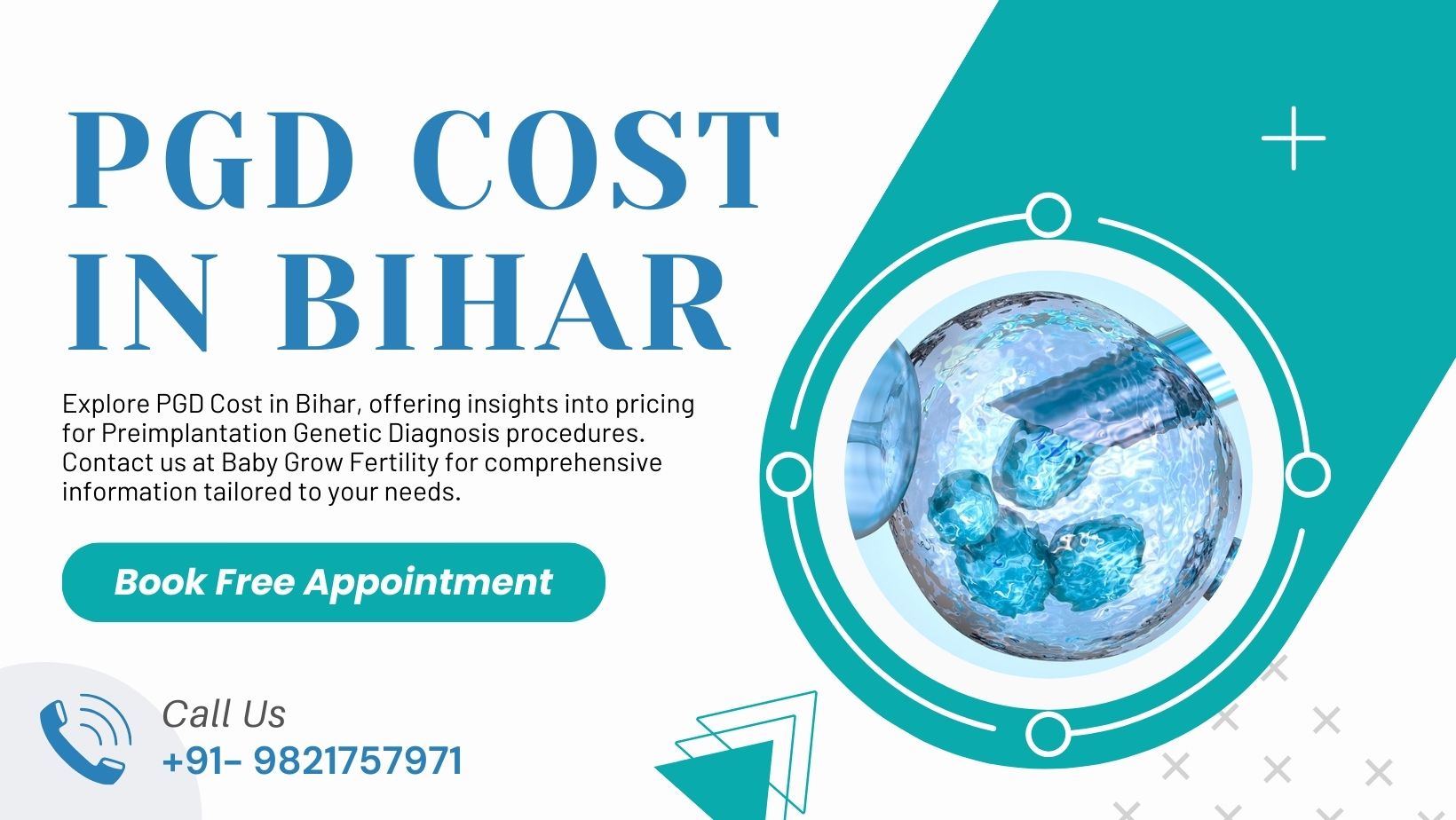Welcome to Baby Grow Fertility, your trusted guide on the journey to parenthood. Today, we delve into the pivotal topic of PGD cost in Bihar. Preimplantation Genetic Diagnosis (PGD) is a cutting-edge technique utilized during fertility treatments to screen embryos for genetic abnormalities before implantation, offering invaluable insights into the health and well-being of future offspring.
Understanding the cost implications of PGD in Bihar is essential for individuals and couples navigating the complexities of fertility treatments. Factors such as clinic reputation, location, and additional services can influence the overall cost of PGD procedures.
At Baby Grow Fertility, we aim to provide comprehensive information and insights into the financial aspects of PGD in Bihar, empowering individuals to make informed decisions about their fertility journey. Stay tuned as we explore the intricacies of PGD Cost in Bihar, helping you navigate your path to parenthood with confidence and clarity.
Understanding PGD Procedure
In comprehending the PGD Procedure, it’s important to outline each step involved in detail:
A. Step-by-Step Process:–
Consultation and Counseling: This initial phase involves meeting with healthcare professionals to discuss medical history, genetic concerns, and expectations regarding PGD. It’s a pivotal stage for gaining insights into the procedure, addressing any queries or apprehensions, and understanding the implications of PGD thoroughly.
Ovarian Stimulation: Ovarian stimulation entails the administration of medications to stimulate the ovaries, encouraging the production of multiple eggs. This step is crucial for optimizing the chances of a successful IVF cycle.
Egg Retrieval: Through a minor surgical procedure called egg retrieval, eggs are collected from the ovaries under sedation. Ultrasound guidance aids in the precise retrieval of eggs, which are then utilized in the subsequent IVF process.
In Vitro Fertilization (IVF): IVF involves fertilizing the retrieved eggs with sperm in a laboratory setting. This facilitates fertilization and the formation of embryos outside the body, laying the foundation for subsequent genetic testing.
Embryo Biopsy: During this procedure, a small number of cells are extracted from each embryo for genetic testing. This biopsy allows for the assessment of genetic abnormalities or disorders, providing crucial information for embryo selection.
Genetic Testing: The extracted cells from embryos undergo genetic testing to screen for specific genetic conditions or abnormalities. Various testing methods, such as aCGH, FISH, or NGS, may be employed to analyze the genetic makeup of embryos.
Embryo Transfer: In the final step, embryos deemed free of genetic abnormalities are selected for transfer into the uterus. Through embryo transfer, carefully selected embryos are implanted into the uterus, with the aim of achieving a successful pregnancy.
B. Role of Genetic Counselors
Genetic counselors play a pivotal role throughout the PGD process, offering support and guidance to prospective parents. They assist in comprehending genetic testing results, navigating decisions regarding embryo selection, and addressing emotional or ethical concerns. Working closely with healthcare professionals, genetic counselors ensure patients receive comprehensive care and make informed choices throughout their PGD journey.
Factors Affecting PGD Cost
Several factors contribute to the overall Cost of PGD, each of which plays a crucial role in determining the financial investment required for the procedure.
Clinic or Hospital Charges: The fees charged by the clinic or hospital where the PGD procedure is performed significantly impact the overall cost. This includes expenses related to consultations, monitoring visits, medical procedures, and facility usage. The reputation, location, and facilities offered by the clinic or hospital may also influence the pricing structure.
Genetic Testing Methods: The choice of genetic testing methods utilized during PGD can greatly affect the cost. Different testing techniques, such as array comparative genomic hybridization (aCGH), fluorescence in situ hybridization (FISH), or next-generation sequencing (NGS), have varying costs associated with them. More advanced or comprehensive genetic testing methods may incur higher expenses.
Additional Services and Medications: Additional services required throughout the PGD process, such as ovarian stimulation medications, anesthesia during egg retrieval, embryo cryopreservation (freezing), and embryo transfer, contribute to the overall cost. The type and duration of medication, as well as the need for any additional medical interventions, can impact expenses.
Insurance Coverage: The extent of insurance coverage for PGD procedures significantly influences the out-of-pocket expenses for individuals or couples undergoing treatment. Some insurance plans may partially or fully cover certain aspects of PGD, such as consultations, genetic testing, or IVF procedures, while others may provide limited or no coverage at all. Understanding insurance benefits and limitations is crucial in determining the financial responsibility of patients.
PGD Cost in Bihar
Exploring PGD Cost in Bihar reveals a range typically starting from INR 25,000 and going up to INR 50,000, depending on various factors such as the clinic’s reputation, location, and additional services included. Preimplantation Genetic Diagnosis (PGD) is a sophisticated technique utilized during in vitro fertilization (IVF) to screen embryos for genetic abnormalities before implantation, aiding in the prevention of inherited diseases and chromosomal disorders. While costs may vary, investing in PGD can offer peace of mind to couples undergoing fertility treatment, knowing that they are taking proactive steps to ensure the health and well-being of their future child.
Detailed Breakdown of PGD Cost Components
In understanding the breakdown of Preimplantation Genetic Diagnosis (PGD) costs, it’s essential to delve into the specific components that contribute to the overall expenses incurred during the procedure.
Clinic Fees: Clinic fees encompass charges associated with the medical services provided by the clinic or fertility center. This includes expenses related to initial consultations, monitoring visits, ultrasound scans, and any other medical procedures performed during the PGD process. Additionally, clinic fees may cover administrative costs and facility usage fees.
Laboratory Fees: Laboratory fees pertain to the costs associated with the use of laboratory facilities for various aspects of the PGD procedure. This includes expenses related to embryo culture, embryo biopsy, genetic testing, and embryo storage (if applicable). Laboratory fees may vary depending on the complexity of the procedures performed and the equipment and expertise required.
Genetic Testing Costs: Genetic testing costs constitute expenses related to the analysis of embryos to screen for genetic abnormalities or disorders. This includes charges for the actual genetic testing performed, as well as any associated laboratory processing fees. The cost of genetic testing may vary depending on the type of testing method used (e.g., aCGH, FISH, NGS) and the number of embryos undergoing testing.
Medication Expenses: Medication expenses encompass the costs of pharmaceutical drugs prescribed as part of the PGD process. This includes medications used for ovarian stimulation to induce egg production, as well as medications administered during the IVF cycle to support follicle growth, trigger ovulation, and prepare the uterus for embryo transfer. The type and dosage of medications required can influence the overall medication expenses.
Other Miscellaneous Costs: Other miscellaneous costs refer to additional expenses that may arise during the PGD process, beyond clinic, laboratory, genetic testing, and medication fees. These may include costs associated with anesthesia during egg retrieval, embryo cryopreservation (freezing) and storage, preimplantation genetic screening (PGS), if performed alongside PGD, and any unforeseen medical or administrative expenses. Additionally, transportation, accommodation, and time off work for appointments may contribute to miscellaneous costs.
Conclusion
In conclusion, Navigating the landscape of PGD cost in Bihar is a significant aspect of planning for assisted reproductive technology. While cost is an important consideration, it’s equally vital to prioritize the quality of care and expertise offered by fertility clinics. By conducting thorough research and consulting with experienced fertility specialists, individuals and couples can make informed decisions about PGD treatment options that align with their needs and budget. Understanding the factors influencing PGD cost, such as clinic reputation, technology utilized, and additional services provided, empowers individuals to embark on their fertility journey with confidence and optimism. With proper guidance and support, achieving reproductive success becomes a tangible and achievable goal.




